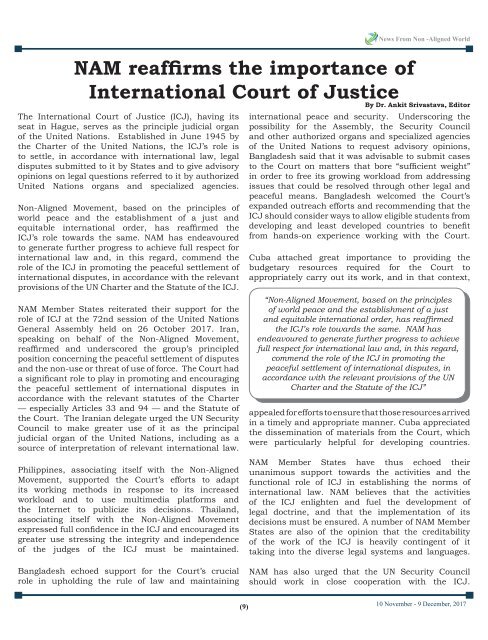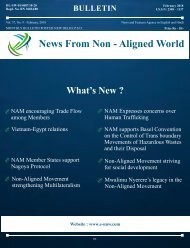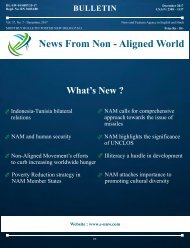10 november 2017_final
You also want an ePaper? Increase the reach of your titles
YUMPU automatically turns print PDFs into web optimized ePapers that Google loves.
NAM reaffirms the importance of<br />
International Court of Justice<br />
By Dr. Ankit Srivastava, Editor<br />
The International Court of Justice (ICJ), having its<br />
seat in Hague, serves as the principle judicial organ<br />
of the United Nations. Established in June 1945 by<br />
the Charter of the United Nations, the ICJ’s role is<br />
to settle, in accordance with international law, legal<br />
disputes submitted to it by States and to give advisory<br />
opinions on legal questions referred to it by authorized<br />
United Nations organs and specialized agencies.<br />
Non-Aligned Movement, based on the principles of<br />
world peace and the establishment of a just and<br />
equitable international order, has reaffirmed the<br />
ICJ’s role towards the same. NAM has endeavoured<br />
to generate further progress to achieve full respect for<br />
international law and, in this regard, commend the<br />
role of the ICJ in promoting the peaceful settlement of<br />
international disputes, in accordance with the relevant<br />
provisions of the UN Charter and the Statute of the ICJ.<br />
NAM Member States reiterated their support for the<br />
role of ICJ at the 72nd session of the United Nations<br />
General Assembly held on 26 October <strong>2017</strong>. Iran,<br />
speaking on behalf of the Non-Aligned Movement,<br />
reaffirmed and underscored the group’s principled<br />
position concerning the peaceful settlement of disputes<br />
and the non-use or threat of use of force. The Court had<br />
a significant role to play in promoting and encouraging<br />
the peaceful settlement of international disputes in<br />
accordance with the relevant statutes of the Charter<br />
— especially Articles 33 and 94 — and the Statute of<br />
the Court. The Iranian delegate urged the UN Security<br />
Council to make greater use of it as the principal<br />
judicial organ of the United Nations, including as a<br />
source of interpretation of relevant international law.<br />
Philippines, associating itself with the Non-Aligned<br />
Movement, supported the Court’s efforts to adapt<br />
its working methods in response to its increased<br />
workload and to use multimedia platforms and<br />
the Internet to publicize its decisions. Thailand,<br />
associating itself with the Non-Aligned Movement<br />
expressed full confidence in the ICJ and encouraged its<br />
greater use stressing the integrity and independence<br />
of the judges of the ICJ must be maintained.<br />
News From Non -Aligned World<br />
international peace and security. Underscoring the<br />
possibility for the Assembly, the Security Council<br />
and other authorized organs and specialized agencies<br />
of the United Nations to request advisory opinions,<br />
Bangladesh said that it was advisable to submit cases<br />
to the Court on matters that bore “sufficient weight”<br />
in order to free its growing workload from addressing<br />
issues that could be resolved through other legal and<br />
peaceful means. Bangladesh welcomed the Court’s<br />
expanded outreach efforts and recommending that the<br />
ICJ should consider ways to allow eligible students from<br />
developing and least developed countries to benefit<br />
from hands-on experience working with the Court.<br />
Cuba attached great importance to providing the<br />
budgetary resources required for the Court to<br />
appropriately carry out its work, and in that context,<br />
“Non-Aligned Movement, based on the principles<br />
of world peace and the establishment of a just<br />
and equitable international order, has reaffirmed<br />
the ICJ’s role towards the same. NAM has<br />
endeavoured to generate further progress to achieve<br />
full respect for international law and, in this regard,<br />
commend the role of the ICJ in promoting the<br />
peaceful settlement of international disputes, in<br />
accordance with the relevant provisions of the UN<br />
Charter and the Statute of the ICJ”<br />
appealed for efforts to ensure that those resources arrived<br />
in a timely and appropriate manner. Cuba appreciated<br />
the dissemination of materials from the Court, which<br />
were particularly helpful for developing countries.<br />
NAM Member States have thus echoed their<br />
unanimous support towards the activities and the<br />
functional role of ICJ in establishing the norms of<br />
international law. NAM believes that the activities<br />
of the ICJ enlighten and fuel the development of<br />
legal doctrine, and that the implementation of its<br />
decisions must be ensured. A number of NAM Member<br />
States are also of the opinion that the creditability<br />
of the work of the ICJ is heavily contingent of it<br />
taking into the diverse legal systems and languages.<br />
Bangladesh echoed support for the Court’s crucial<br />
role in upholding the rule of law and maintaining<br />
NAM has also urged that the UN Security Council<br />
should work in close cooperation with the ICJ.<br />
(9)<br />
<strong>10</strong> November - 9 December, <strong>2017</strong>

















